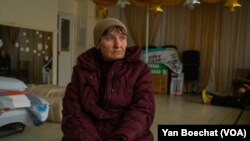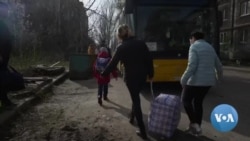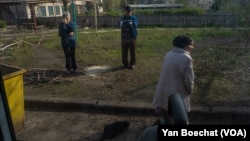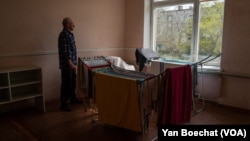It took Svetlana and her husband, Misha, 19 years to get their own apartment. It was on the seventh floor of a 10-story building, the highest in the Ukrainian city of Bakhmut.
This was in 1995, a few years after she exchanged her Soviet Union passport for a Ukrainian one at the local police station. The apartment was a “gift” to them by the government when their name finally came up on a waiting list left over from Soviet times.
Twenty-eight years later, the couple are now in their 70s and Misha is recovering from a recent stroke. He can walk a little but needs help with every move. Svetlana is slight, weighing no more than 45 kilos, wrapped in a maroon puffy jacket and wearing faded sparkling ballet-style shoes.
Their beloved apartment is now in the epicenter of the most violent battle of Russia’s war in Ukraine to date. Svetlana says many families remaining are too scared to leave their basements to seek help. The shelling is constant and sometimes deafening.
“I left the apartment with tears in my eyes,” Svetlana tells us a few days after escaping the city. “I remember thinking: ‘We are getting older, and we may never go home again.’”
The bunker
When the war began in February of last year, Svetlana and Misha stayed home as long as possible. By September, there was no heat, running water or electricity to run the elevator and Misha couldn’t walk up the seven flights of stairs. They had to move.
In October, they took shelter at a family member’s house about 300 meters away. It was on the ground floor, and it had a nearby underground bunker, usually meant for food storage.
Svetlana and Misha lived with her brother-in-law Kolya, 70, and his son, 45-year-old Oleg, for seven months. Kolya’s wife, who was Svetlana’s sister, died of breast cancer five years ago.
Until the end of February this year, it was still possible to go to one of the few open shops, and aid workers regularly brought food and water to community bunkers they call “unbroken” or “invincibility” points.
But by early March, even the most daring aid workers couldn’t get into Bakhmut. Many families were trapped.
“We were between the two sides,” says Svetlana. “There were Russians on our right and Ukrainians on the left.”
The family had food — macaroni, beans and bread — stored in their bunker and Ukrainian soldiers nearby shared some of their meat. For weeks, they slept underground and came outside during quiet moments of the day.
In early April, a bomb fell directly onto their bunker, killing and burying Kolya and Oleg. After two hours of digging they were able to rescue their dog, Dana, a German Shepherd.
“The dog must have been going out of the bunker when it hit because she wasn’t buried deep,” explains Svetlana. “We would need heavy machinery to dig out my relatives.”
Escape from Bakhmut
After the bombing, Svetlana’s determination to live or die in her home city quickly fizzled. She waited for the sound of passing soldiers and went outside to catch their attention.
It took three days of darting outdoors and waving her arms in the direction of the streets, despite the ongoing battle, to find a team able to evacuate them. Most passing soldiers were running for cover from bombings.
Some Ukrainian soldiers saw her and came back to help during a moment of respite. They allowed her to stop briefly at her 10-story apartment building to gather a few belongings.
The building had been bombed that morning and was still smoking from the fire that ensued. Still, two families remained, on the sixth and seventh floors. “I asked them, ‘Why don’t you come with us?’” says Svetlana.
They told her that they had put out the fire themselves, and that they didn’t want to leave their homes. To Svetlana now, this seems irrational.
Svetlana, however, says she understands the feeling: It’s love for home and attachment to the graves of lost relatives. It’s fear of life as a refugee, homeless and impoverished. It’s also Russian-spread rumors that Ukrainian evacuation teams kidnap children.
“My husband is frail,” she says. “Otherwise, maybe I wouldn’t have gone either.”
Kindergarten shelter
Svetlana tells us this story at a kindergarten-turned-displaced families shelter in the city of Kostiantynivka, about 30 kilometers from Bakhmut. You can hear the din of artillery being fired into and out of this city, but mostly it lands like a dull thud in the distance, not like the cacophony of deadly blasts heard daily in Bakhmut.
“The first thing I noticed was that plants and trees are alive here,” says Svetlana. It is mid-April and the winter’s last snow has just melted, leaving muddy walkways and blossoming trees. “Everything in Bakhmut is destroyed and dead. Here, everything, all the plants are flourishing.”
We talk in a room that was once a dance studio for small children. Four cots lie next to a mirrored wall with gold star balloons hanging from the ceiling. A small table holds toy soldier figurines and a small plastic panda bear.
Misha lies quietly on a cot while we speak. Tomorrow, the couple will board an ambulance that will bring them to their son, who lives in Dnipro, a “safe” city that is only bombed every week or two.
Before this war, Bakhmut was known for its sparkling wine and salt industries. But many residents are prouder of the city’s roses. A reporter asks Svetlana if there were roses in her area. She looks away.
“At any rate, we will plant more roses,” she says.
Yehor Konovalov contributed to this report.



















